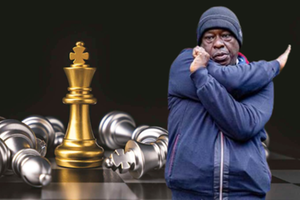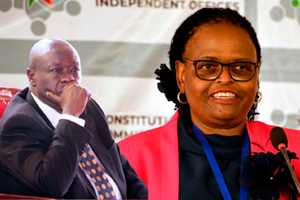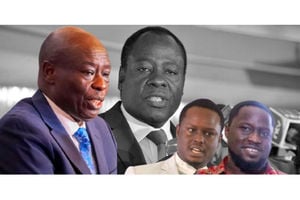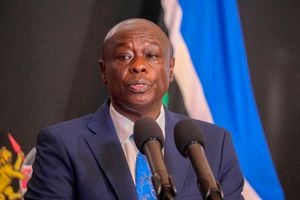
Deputy President Rigathi Gachagua follows proceedings during his impeachment trial at the Senate, Parliament Buildings, Nairobi, on October 16, 2024.
Deputy President Rigathi Gachagua suffered a string of losses on the first day of his impeachment trial at the Senate on Wednesday, even as he battles for survival ahead of today’s voting by senators.
In a marathon legal battle, the DP’s legal team had a day to forget as their preliminary objections were thrown out by Speaker Amason Kingi, signalling an early setback for the besieged second-in-command. The DP lost bids to block the submission of new evidence, presentation of new witnesses and an objection to the composition of the National Assembly’s legal team.
Cobbling up a retinue of 14 legal minds led by Senior Counsel Paul Muite and Mr Elisha Ongoya, the 59-year-old began with opposing Senior Counsel James Orengo representing the National Assembly in the impeachment proceedings.
According to Mr Ndegwa Njiru, the objection to the appearance stemmed from the fact that Mr Orengo is a full-time serving State officer by virtue of being Siaya governor as per Article 260 of the Constitution, as read together with Section 26, subsection (2), of the Leadership and Integrity Act. He said the provisions of the law bar a full-time State officer from engaging in any other gainful employment.
Mr Njiru added that it would be prejudicial to the DP if the Senate allowed Mr Orengo to represent the National Assembly in the proceedings.
“The High Court ruled that a person engaged in full-time employment cannot purport to appear and represent a party before this assembly,” said Mr Njiru. “It will raise a serious conflict of interest and prejudice our client and violate clear provisions of the law. In that respect, we invite you Mr Speaker to uphold our objection,” he added.
However, the National Assembly’s legal team challenged the DP’s team to provide evidence that Mr Orengo was participating in gainful employment. Mr Eric Gumbo argued that no prejudice had been demonstrated against the DP by the participation of Mr Orengo in the proceedings.
Conflict of interest
“There is no evidence of conflict of interest or prejudice by the participation of Orengo in the impeachment trial. In the absence of any prejudice, we urge that case to be dismissed,” said Mr Gumbo. “Further, no evidence or assertion has been presented that Mr Orengo has benefited by being in this House participating as a counsel. With that, we urge that the objection be dismissed.”
When Mr Kingi rose to make his ruling, he was terse, arguing that the DP’s counsel did not adduce evidence to prove the allegation of gainful employment.
“It is trite law that he who asserts must prove,” Mr Kingi said, terming as surprising the fact that Mr Njiru had attempted to shift the onus of proving the claim to the National Assembly.
“That argument is untenable. It therefore follows that both the contention of the counsel for the Deputy President that his side would be prejudiced by the appearance of Senior Counsel James Orengo and the rebuttal by the National Assembly that no prejudice will be occasioned are moot,” said Mr Kingi as he dismissed the objection.
Not deterred, however, Mr Njiru opened another battlefront as he invited Mr Kingi to rule on documents submitted by the National Assembly on Monday, which he claimed were not part of the bundle of documents served on the DP on Wednesday last week.
The documents include an affidavit sworn by Mr Peterson Njomo Muchira as well as a document of the National Assembly marked as Volume 8 comprising responses from various government agencies. Mr Njiru argued that the documents prejudiced the DP’s case and would amount to trial by ambush by the National Assembly.
“We move ... to have the documents expunged as they [amount to] new evidence,” he said. But Mr Kingi referred the legal team to a letter by Senate Clerk Jeremiah Nyegenye dated October 9, 2024 that required parties to the impeachment trial to, amongst other things, specify any other evidence to be relied on in the matter.
The former Kilifi governor observed that it was in response to the invitation that the National Assembly on October 14, 2024 filed further documentation.
He subsequently pointed out that, having analysed the documentation submitted against the grounds for the proposed impeachment, the documents objected to constitute evidence in support of the allegations made in the impeachment motion as received from the National Assembly.
“Accordingly, the documents being referred to do not constitute new evidence but form evidence in support of an allegation which was already made,” said Mr Kingi.
“What is not allowed is to introduce new allegations or to introduce any evidence that is extraneous to the allegations made in the impeachment Motion,” the Speaker added.
But more devastating losses were to follow with the DP’s legal team unable to stop a request by the National Assembly to have Ethics and Anti-Corruption Commission chief executive officer Twalib Mbarak appear before the Senate as a witness to give evidence over a Sh3.7 billion Kenya Medical Supplies Authority (Kemsa) mosquito nets scandal.
The deal is one of the 11 charges facing Mr Gachagua where he is accused of intimidating former Kemsa CEO Andrew Mulwa with the aim of influencing the award of the Sh3.7 billion tender.
Mr Muite raised a complaint that having Mr Mbarak appear before the Senate as a witness will go against the spirit of Article 50 of the Constitution on fair trial.
In his objection, he said allowing the National Assembly to call witnesses at that stage of the trial without first furnishing the DP with a witness statement will irredeemably prejudice their client’s case.
“Nothing would be more prejudicial to call witnesses whose statements or evidence we have not seen. The whole purpose of the affidavit and witness statement is to enable the other side, in this case the DP, to seek legal advice and give instructions on how best to respond to it,” said Mr Muite.
However, Speaker Kingi threw out the objection, saying, that the summons sought are in line with the spirit of rule 10 of the parliamentary procedure rules.
“You may attack the evidence when these particular witnesses are summoned if their evidence introduces new allegations and at that particular juncture I will listen to you,” he said.
Continuing with the humbling defeats, Mr Ongoya raised another objection to a line by Mr Orengo to disclose some parts of evidentiary documents detailing how Mr Gachagua allegedly had his late brother Nderitu Gachagua sign a Will while gravely ill and bedridden.
“The facts that you are being referred to have no basis in the motion and the grounds. Unless the senior counsel can draw your attention to any ground in the motion that the facts are addressing,” said Mr Ongoya.
“The ruling is yours but we owe it to the Deputy President and the integrity of our checks and balances institutions to maintain basic decency in these proceedings,” he added.
But Speaker Kingi hit back, saying: “I cannot tell you how you are going to make your opening statement. If you choose to go outside it, then that is up to you. The senators are here listening and they will be able to make the necessary decisions at the end of the process.”
When the hearing began later in the afternoon, the National Assembly took three hours to lay bare a dossier that they are banking on to sink the one-term MP.
Using the evidence of Kibwezi West MP Mwengi Mutuse, the mover of the impeachment motion at the National Assembly, the Senate heard how Mr Gachagua’s shareholding assertions could have put the country on the brink of post-election violence as the statements sought to discriminate and alienate a part of the country that did not vote for the Kenya Kwanza government.
“The DP has violated various sections in our Constitution. For the last two years, Mr Gachagua has visited various places in Kenya and has been publicising a notion that Kenya is a company that is owned by shareholders and that those who own shares in the company called Kenya would benefit in development and in terms of service delivery. It is in our contention that Kenya is not a company,” said Mr Mutuse.
“To talk about shareholders, to talk about some people being able to reap on the basis of shareholding, that is repugnant and is in conflict with the provision of the constitution,” said Mr Orengo.
Assertions by Mr Gachagua that he represents a certain region of the country were also put forward as one of the statements that demean the office of a Deputy President.
“The Deputy President standing here on trial assumes that he was elected to represent the interest of a certain region whereas the Constitution is very clear; he is elected by the whole country. He has no area to protect,” said Mr Orengo.
But in his rebuttal, Mr Ongoya argued that affidavits tabled by the National Assembly backing the impeachment of the Deputy President do not have evidence to show that Mr Gachagua insubordinated his boss.
“The motion presented and approved by the National Assembly will remain in constitutional history as the most embarrassing motion ever approved by a House of Parliament in the Commonwealth,” said Mr Ongoya.
“We ask the Senate to make a decision based on the evidence tested during the cross-examination. The motion presented before this House is false, ridiculous and embarrassing,” he added.
This morning, it will be the turn of the Deputy President to take the stand to counter all the charges levelled against him.
In the submissions, Mr Gachagua will present evidence, affidavits and witnesses, during which he is the only one lined up to testify.
One hour will be dedicated to cross-examination and re-examination of the witnesses before senators are given an hour to ask questions or request for clarifications.
There will be closing statements by the two parties before the floor is opened for debate, which will then culminate in a voting session.
Mr Gachagua will be deemed to have been removed from office should at least 45 out of the 67 Senators vote to uphold any of the 11 charges that have been levelled against him.










